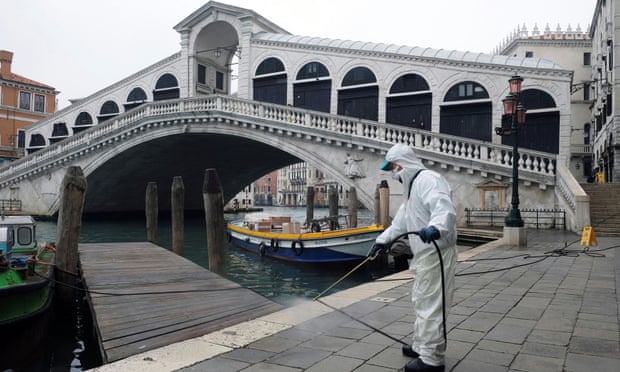If there were any doubts as to how seriously European officials are treating the Covid-19 emergency, the Italian prime minister Giuseppe Conte’s
reference to this being his country’s “darkest hour” should help dispel
them. Italy is the European country currently most affected by the
virus, with the highest number of cases and fatalities. It might be the
first in the region to be badly hit, but it almost certainly won’t be
the last.
Whether even more aggressive or creative action may be required in
the coming weeks or months, no one knows. The initial reaction to the
measures announced by the European Central Bank
was mixed. But unlike the sovereign debt crisis – which first affected
Greece and then Italy, Spain and Portugal – there is no political or
economic divide between the needs of the core and the periphery of
Europe in the face of the coronavirus challenge.
While Italy’s expenditure on healthcare as a share of GDP is in line
with most of its European neighbours, it stands apart from the rest of
the euro area on its poor economic fundamentals. Italy’s GDP is only 5%
higher than it was in 2000; in France it is 29%. Unemployment and
government debt are also high relative to the rest of the euro area,
while levels of government investment – a decade ago on par with the
rest of the euro area and the UK – are now significantly lower.
As Italy
and much of the region probably now faces a technical recession, all
eyes are on whether the fiscal and monetary measures being introduced
will prevent a health emergency from becoming an economic emergency,
with companies and households unable to pay their debts.
Precisely how bad the Italian and euro area economic data will turn
out to be over the first half of this year is hard to estimate. But if
Italian output declined by, say, 20% this month, flatlined next month,
and then the economy started to bounce back over the course of May and
June, GDP declines for both the first and second quarters will prove to
be twice as bad as anything seen during even the lowest points of the
2008 financial crisis.
With other parts of Europe
now seeing school closures, parents staying at home to look after their
children, restaurants and other retailers shutting their doors and
consumer spending on non-essential goods and services being put on hold,
other countries will undoubtedly see a similar situation unfold. The
only question is one of timing.
Another concern is that even if the immediate crisis ends up being
contained over the coming months, the aftershocks could linger well
beyond that, as the summer tourism season is wiped out and businesses
lose a huge portion of their annual revenues. In southern Europe, that
could mean the banks face another wave of loan defaults, national
governments take in much lower than anticipated tax revenues, and the
markets then question the sustainability of government finances and
whether the weakest banks across Europe can get by without having to
raise additionalcapital.
Faced with these risks, European policymakers are stepping up their
response. Fiscal policy, as expected, is leading the way, with the
governments looking at a variety of measures, including postponing tax
collection, allowing households and businesses to delay mortgage and
loan repayments, giving banks the regulatory leeway to allow customers
to postpone debt interest payments, helping the self-employed with cash
payments, and governments underwriting emergency loans to small and
medium-sized enterprises.
Similarly, the ECB responded last week by expanding the size of its quantitative easing
programme and by providing banks with the ability to borrow money at
even lower rates. The hope is that these actions are transmitted into
the real economy, lowering borrowing costs for governments, households
and companies, and will lay the foundations for a stronger recovery once
the worst of the epidemic is behind us and economies start to claw back
whatever output will be lost over the coming months.
Marchel Alexandrovich is senior European economist at the global investment banking firm Jefferies
https://www.theguardian.com/commentisfree/2020/mar/17/italy-europe-covid-economy-ecb-coronavirus

